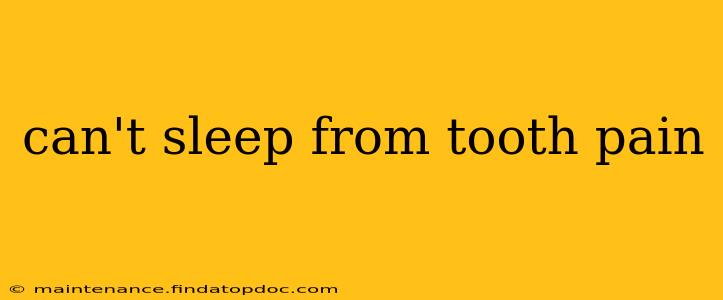Experiencing tooth pain that keeps you awake at night is incredibly frustrating and can leave you feeling exhausted and irritable. The throbbing ache can make even the most comfortable bed feel like a torture device. This guide offers practical solutions and advice to help you find relief and get some much-needed sleep.
What Causes Tooth Pain That Prevents Sleep?
Tooth pain severe enough to disrupt sleep can stem from various sources. Understanding the underlying cause is crucial for effective treatment. Common culprits include:
- Cavities: Bacteria erode tooth enamel, leading to pain, especially when consuming hot, cold, sweet, or acidic foods and drinks.
- Abscesses: A pocket of pus forms at the root of a tooth, causing intense, throbbing pain that often radiates to other areas of the face.
- Gum disease (periodontal disease): Inflammation and infection of the gums can cause pain, sensitivity, and bleeding.
- Cracked or chipped tooth: A fracture in the tooth can expose the sensitive dentin layer, resulting in sharp, shooting pains.
- Bruxism (teeth grinding): Grinding your teeth, especially at night, can wear down enamel and cause jaw pain, headaches, and tooth sensitivity.
- Wisdom teeth: Impacted or partially erupted wisdom teeth can cause pain, inflammation, and infection.
- Sinus infection: Sinus infections can sometimes cause referred pain to the upper teeth.
What Can I Do for Tooth Pain at Night?
When the pain strikes and sleep is impossible, several home remedies can provide temporary relief:
- Over-the-counter pain relievers: Ibuprofen (Advil, Motrin) or naproxen (Aleve) can reduce inflammation and pain. Acetaminophen (Tylenol) can also help manage the pain but doesn't address inflammation. Always follow the recommended dosage on the label.
- Saltwater rinse: Dissolve a teaspoon of salt in a glass of warm water and gently rinse your mouth. This can help clean the area and reduce inflammation.
- Cold compress: Applying a cold compress to your cheek can help numb the area and reduce swelling.
- Dental floss: If food is lodged between your teeth, gently floss to remove it. However, avoid flossing if you have an open wound or sensitive gums.
How Can I Get Rid of Tooth Pain Fast?
While home remedies offer temporary relief, they don't address the underlying cause. For rapid and lasting relief, you need to see a dentist as soon as possible. They can diagnose the problem and recommend appropriate treatment, which may include:
- Root canal: This procedure is necessary if the pulp (nerve) of your tooth is infected or damaged.
- Dental filling: For cavities, a filling can restore the tooth's structure and protect it from further damage.
- Crown: A crown protects a damaged or weakened tooth.
- Extraction: In severe cases, a tooth may need to be extracted.
- Antibiotics: If an infection is present, antibiotics will be prescribed.
What If I Can't See a Dentist Immediately?
If you can't see a dentist immediately, continue using over-the-counter pain relievers as directed. The cold compress and saltwater rinse can also provide temporary comfort. However, delaying dental care can worsen the problem and lead to more extensive (and costly) treatment down the line.
Can Tooth Pain Keep You Awake Long Term?
Chronic tooth pain can lead to significant sleep deprivation, impacting your overall health and well-being. Untreated dental problems can also lead to more serious health issues. Addressing the underlying cause of your tooth pain is critical for both your oral health and your sleep quality.
What Causes Toothache at Night?
Many of the same causes listed above contribute to nighttime toothaches. However, some factors become more prominent at night:
- Bruxism: Teeth grinding often occurs during sleep, exacerbating existing tooth sensitivity or causing new damage.
- Changes in blood flow: Blood flow can alter during sleep, potentially increasing sensitivity and pain in affected areas.
- Postural changes: Lying down can alter pressure within the mouth, affecting already sensitive teeth or jaw joints.
Addressing tooth pain promptly is crucial for both short-term relief and long-term oral health. Don't suffer in silence; contact a dentist as soon as possible to diagnose and treat the underlying problem. Getting proper dental care is an investment in your overall health and well-being, and it's a critical step towards getting a good night’s sleep.
